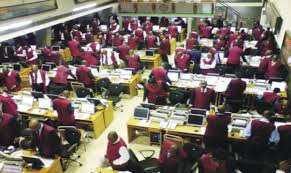The Economic downturn in the Country has continued to hit various sectors of business impacting on equities at the Nigerian Stock Exchange as the NSE All-Share Index and Market Capitalization both depreciated by 0.003% to close last week at 27,918.59 and N13.606 trillion respectively.

All other indices finished higher with the exception of NSE-Main Board, NSE Banking, NSE Pension, NSE Insurance, NSE AFR Div Yield and NSE Oil/Gas indices which depreciated by 0.28 per cent, 0.39 per cent 0.18 per cent, 0.94 per cent 1.13 per cent and 0.19 per cent.
Total turnover of 1.069 billion shares worth N11.393 billion in 16,346 deals were traded this week by investors in contrast to a total of 1.086 billion shares valued at N13.390 billion that exchanged hands last week in 15,774 deals.
The Financial Services industry (measured by volume) led the activity chart with 606.437 million shares valued at N5.381 billion traded in 7,529 deals; thus contributing 56.75% and 47.23% to the total equity turnover volume and value respectively.
The ICT Industry followed with 225.576 million shares worth N1.776 billion in 751 deals. The third place was Conglomerates Industry with a turnover of 66.375 million shares worth N85.924 million in 890 deals.

Trading in the Top Three Equities namely, Courteville Business Solutions Plc, United Bank for Africa Plc and FCMB Group Plc (measured by volume) accounted for 402.694 million shares worth N819.828 million in 1,526 deals, contributing 37.68% and 7.20% to the total equity turnover volume and value respectively.
Observers attribute the prevailing economic situation to the prolonged confidence crisis as well as slow economic activities witnessed in the country in the past few years.
Meanwhile Analysts believe that the extended bearish market featured at the Exchange despite the release of the much awaited ministerial list may be as a result of the widespread dissatisfaction over the calibre of the nominees, restoration of Value Added Tax (VAT) charges that has heightened transaction costs in the market.
The ugly trend has triggered continued volatility and selloffs on the exchange, given that the stock market cannot be dissociated from the systemic problems in the nation’s politico-economic environment.
For instance weak scorecards emanating from listed companies extended the bearish sentiments, as the first quarter (Q1) and second quarter (Q2) numbers released so far were weak and below market expectations.















